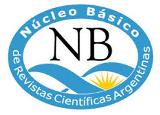El amor qu’es fino amor in medieval lyric poetry
Considerations regardinf the term ‘courtly love’ in courtly poetry of the Middle Ages
DOI:
https://doi.org/10.24215/23139048e055Keywords:
courtly love, courtly poetryAbstract
The article questions the use of the concept 'courtly love' for the literary analysis of medieval literature and proposes to review some of the characteristics that constitute it —the feudalization of love, the characterization of the beloved and the secrecy— through a diachronic analysis of the courtly poetry of the Middle Ages —the Occitan or Provençal lyric, the Galician-Portuguese lyric and the Castilian lyric—. An evolution of these characteristics is proposed that allows us to observe the constants and variations of ‘courtly love’ in medieval courtly poetic texts.
Downloads
References
Bahler, I. y Gyékényesi Gatto, K. (1992). Of Kings and Poets. Cancionero Poetry of the Trastamara Courts [De reyes y poetas. Poesía de cancionero en las cortes de los Trastámara]. Nueva York, Estados Unidos: Peter Lang.
Beltran, V. (2002). Poesía española 2. Edad Media: lírica y cancioneros. Barcelona, España: Crítica.
Beltrán, V. y Martínez Romero, T. (Dirs.). Corpus des Trobadours [Corpus de trobadores]. Institut d’Estudis Catalans. Recuperado de https://trobadors.iec.cat
Beysterveldt, A. Van (1972). La poesía amatoria del siglo XV y el teatro profano de Juan del Enzina. Madrid, España: Ínsula.
Bezzolla, R. (1966). Les origenes et la formation de la littérature courtoise en Occident [Los orígenes y la formación de la literatura cortesana en Occidente]. París, Francia: Champion.
Blanco Rivero, J. J. (2012). La historia de los conceptos de Reinhart Koselleck: conceptos fundamentales, Sattelzeit, temporalidad e histórica. Politeia, (35-49), 1-33. Recuperado de http://www.redalyc.org/pdf/1700/170029498009.pdf
Blanco Valdés, C. (1996). El amor en el dolce stil novo. Fenomenología: teoría y práctica. Santiago de Compostela, España: Universidade de Santiago de Compostela.
Duby, G. (1999) [1988]. El matrimonio en la sociedad de la alta Edad Media. En B. Rojas (Comp.), Obras selectas de Georges Duby (pp. 278-292). Ciudad de México, México: Fondo de Cultura Económica.
Fossier, R. (2019) [2007]. Gente de la Edad Media (Trad. Paloma Gómez Crespo y Sandra Chaparro Martínez). Ciudad de México, México: Debolsillo.
Freud, S. (1920/2020). Más allá del principio del placer (Trad. Joaquín Chamorro Mielke). Madrid, España: Akal.
Grasotti, H. (1969). Instituciones feudo-vasalláticas en León y Castilla. Spoleto, Italia: Centro italiano di studi sull'alto Medioevo.
Lacan, J. (2000) [1959-1960]. La ética del psicoanálisis. Barcelona, España: Paidós.
Lamberti, M. (febrero de 2019). La invención del amor. Revista de la Universidad de México, 54-60. Recuperado de https://www.revistadelauniversidad.mx/articles/55a39813-cd30-4a6e-b70f-08f45bd6fae3/la-invencion-del-amor
Lapesa, R. (1982). De la Edad Media a nuestros días: estudios de historia literaria. Madrid, España: Gredos.
Le Gentil, P. (1952-1953). La poésie lyrique espagnole et portugaise à la fin du Moyen Age [La poesía lírica española y portuguesa al final de la Edad Media]. Rennes, Francia: Plihon.
Le Goff, J. (2016). ¿Realmente es necesario cortar la historia en rebanadas? Ciudad de México, México: Fondo de Cultura Económica.
Le Goff, J. (1983). El ritual simbólico del vasallaje. En Tiempo, trabajo y cultura en el occidente medieval (pp. 328-391) (Trad. Mauro Armiño). Madrid, España: Taurus.
Meléndez Cabo, M. y Vega Vázquez, I. (2010). Guía para o estudo da lírica profana galego-portuguesa [Guía para el estudio de la lírica profana gallego-portuguesa]. Santiago de Compostela, España: Xunta de Galicia/CRPIH.
Moore, J. (2012). ‘Amor cortés’: un problema de terminología. En A. Basarte (Comp.) y María Dumas (Ed.), Nueve ensayos sobre el amor y la cortesía (pp. 253-274). Ciudad Autónoma de Buenos Aires, Argentina: Facultad de Filosofía y Letras, Universidad de Buenos Aires.
Moreno, F. Á. (2018). Star Wars, el amor cortés y el horror cósmico lovecraftiano. Hélice: reflexiones críticas sobre una ficción especulativa, IV(24), 6-18. Recuperado de https://www.revistahelice.com/helice-24-vol-iv-no10/
Paris, G. (1883). Études sur les romans de la table ronde. Lancelot du lac: II. Le ‘Conte de la charrette’ [Estudios sobre los roman del mesa redonda. Lanzarote del Lago: II. El ‘Caballero de la carreta’]. Romania, 12(48), 459-534.
Régnier-Bohler, D. (2003). Amor cortés. En J. Le Goff y J-C. Schmitt (Eds.), Diccionario razonado del occidente medieval (pp. 23-29). Madrid, España: Akal.
Riquer, M. de (2011) [1948]. Los trovadores. Historia literaria y textos. Barcelona, España: Ariel.
Sánchez Albornoz, C. (1993). Orígenes del feudalismo. Oviedo, España: Itsmo.
Severin, D. (Dir.) (2007-). An Electronic Corpus of 15th Century Castilian Cancionero Manuscripts [Un corpus electrónico de los manuscritos cancioneriles castellanos del siglo XV]. Liverpool, Inglaterra: University of Liverpool.
Tato Fontaíña, L. (1996). Lírica medieval. Cantigas de amor. Cantigas de amigo. En Historia da literatura galega, volume I (pp. 65-96). Vigo, España: A Nosa Terra/AS-PG.
Published
How to Cite
Issue
Section
License
Copyright (c) 2022 Cuadernos de H ideas

This work is licensed under a Creative Commons Attribution-NonCommercial-ShareAlike 4.0 International License.
The acceptance of an original by the journal implies the non-exclusive transfer of the economic rights of the authors in favor of the editor, who allows reuse, after editing (postprint), under a Creative Commons Attribution License -NonCommercial-ShareAlike 4.0 International (CC BY-NC-SA 4.0)
In accordance with these terms, the material can be shared (copied and redistributed in any medium or format) and adapted (remixed, transformed and created from the material another work), provided that a) the authorship and original source of its publication (magazine and URL of the work), b) is not used for commercial purposes and c) the same license terms are maintained.
The transfer of non-exclusive rights implies that after its publication (postprint) in Cuadernos de H ideas the authors can publish their work in any language, medium and format; in such cases, it is requested that it be stated that the material was originally published in this journal.
Such assignment also implies the authorization of the authors for the work to be harvested by SEDICI, the institutional repository of the National University of La Plata, and be disseminated in the databases that the editorial team considers appropriate for increase the visibility of the publication and its authors.
Likewise, the journal encourages the authors so that after their publication in Cuadernos de H ideas they deposit their productions in other institutional and thematic repositories, under the principle that offering society scientific and academic production without restrictions contributes to a greater exchange of global knowledge.










.png)

























